Martin Luther: The Spark of Protestant Reformation (1483 - 1546)
Martin Luther (1483-1546) was a German monk, theologian, and key figure in the Protestant Reformation. His actions and writings challenged the teachings and practices of the Roman Catholic Church, leading to significant religious and social changes in 16th-century Europe. Here is an overview of Martin Luther's life and his role in sparking the Protestant Reformation:
Early Life and Education:
Birth and Childhood:
Martin Luther was born on November 10, 1483, in Eisleben, Germany, to a middle-class family.
Education and Monastic Life:
Luther studied law at the University of Erfurt but, after a near-death experience during a thunderstorm, he vowed to become a monk. In 1505, he entered the Augustinian Monastery in Erfurt.
Theology and Faith Struggles:
Struggle with Faith:
Luther experienced deep spiritual struggles and felt a profound sense of unworthiness before God. He sought assurance of salvation through rigorous religious practices.
Visit to Rome (1510):
Luther's visit to Rome in 1510 further disillusioned him with the corruption and laxity he observed within the Catholic Church.
Ninety-Five Theses (1517):
Indulgences Controversy:
In 1517, Luther protested against the sale of indulgences, which were certificates believed to reduce the temporal punishment for sins. He outlined his objections in his famous Ninety-Five Theses.
Widespread Impact:
Luther's Ninety-Five Theses were quickly translated and spread across Europe due to the recent invention of the printing press. This marked the beginning of the Protestant Reformation.
Excommunication and Imperial Diet of Worms (1521):
Papal Bull and Excommunication:
In 1520, Pope Leo X issued a papal bull threatening Luther with excommunication. Luther responded by publicly burning the bull.
Diet of Worms:
In 1521, Luther was summoned to the Diet of Worms, where he was asked to recant his views. He famously declared, "Here I stand, I can do no other," refusing to recant. As a result, he was excommunicated by the Catholic Church.
Translation of the Bible and Theology:
Translation of the Bible:
Luther translated the Bible into German, making it accessible to a broader audience. This translation had a profound impact on the German language and culture.
Theology of Grace:
Luther's theology emphasized salvation by faith alone, rejecting the Catholic doctrines of indulgences, sacraments, and the authority of the Pope.
Formation of Lutheran Church:
Spread of Lutheranism:
Lutheranism, the theological and doctrinal system developed by Luther, gained followers across Europe. It became the basis for the formation of Lutheran churches.
Marriage and Family:
Luther married Katharina von Bora, a former nun, in 1525. They had six children, and their marriage became a model for Protestant clergy.
Legacy and Impact:
Religious Wars and Peace of Augsburg:
Luther's teachings contributed to religious conflicts, including the Peasants' War (1524-1525) and the broader upheavals of the Reformation. The Peace of Augsburg in 1555 recognized the principle of "cuius regio, eius religio" (whose realm, his religion), allowing rulers to choose the religion of their territories.
Cultural and Social Impact:
The Reformation had profound cultural, social, and political consequences, influencing education, governance, and the emergence of different Protestant denominations.
Death:
Death of Martin Luther:
Martin Luther died on February 18, 1546, in Eisleben, the town of his birth. His teachings continued to shape the development of Protestantism in the centuries that followed.
Martin Luther's actions and writings laid the groundwork for the Protestant Reformation, challenging the authority and practices of the Catholic Church. His emphasis on salvation by faith, rejection of indulgences, and translation of the Bible into the vernacular had a lasting impact on Christianity and European history.
-
 32:45
32:45
HandinHandwithGodTv
2 months agoMentions You @ Power To Triumph || This Is Not Home For Believers In Christ Jesus || March 14, 2024.
3 -
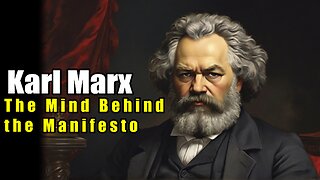 3:15
3:15
100 Historical Figures
3 months agoKarl Marx: The Mind Behind the Manifesto (1818 - 1883)
154 -
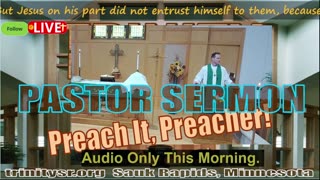 20:21
20:21
Fan of Trinity Lutheran Church - Sauk Rapids See Description
2 months ago20240303 March 3rd Pastor Sermon Trinity Lutheran Sauk Rapids MN
173 -
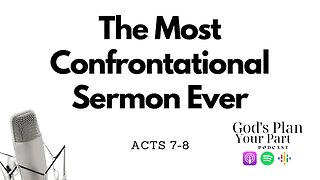 24:20
24:20
Gods Plan Your Part
4 months agoActs 7-8 | Stephen's Sermon, His Martyrdom, and the Spread of Christianity Through Persecution
50 -
 5:13
5:13
Decoding God's Time Machine
2 months agoWhy The Catholic Church is the True Church, Part 2: The Sola Scriptura Heresy
13 -
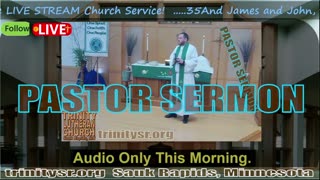 9:50
9:50
Fan of Trinity Lutheran Church - Sauk Rapids See Description
2 months ago20240317 Mar 17th Pastor Sermon Trinity Lutheran Sauk Rapids MN
313 -
 23:15
23:15
Fan of Trinity Lutheran Church - Sauk Rapids See Description
2 months ago20240331 Mar 31st EASTER Pastor Sermon Trinity Lutheran Sauk Rapids MN
392 -
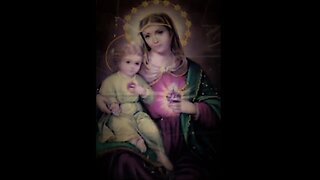 53:45
53:45
Sancta Sedes Apostolica - The Holy Apostolic See
2 months agoInvalid Sacrament of Penance of the heretics...The Holy See Canons of ANATHEMA...18 March, 2024 AD
17 -
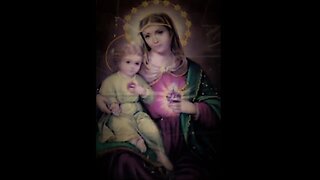 34:52
34:52
Sancta Sedes Apostolica - The Holy Apostolic See
3 months agoWhom ONLY can merit from spiritual crosses and sufferings...1 March, 2024 AD
25 -
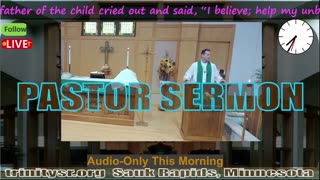 16:23
16:23
Fan of Trinity Lutheran Church - Sauk Rapids See Description
27 days ago20240505 May 5th Pastor Sermon Trinity Lutheran Sauk Rapids MN
323